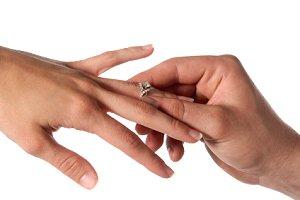
When couples want marriage proposals that are unique and personalized, marriage proposal etiquette can inadvertently be overlooked. It is important to remember courtesy and convention when asking for a partner's hand in marriage, and following appropriate etiquette guidelines can ensure the proposal is both memorable and suitable.
Why Etiquette is Important
Etiquette is not just a set of antiquated rules - it is a guideline for socially and personally acceptable behavior in different situations. A marriage proposal may seem to include just the happy couple, but many people will be affected by it, including the couple's parents, family members, and friends. Improper etiquette could lead to misjudged feelings, estranged relationships, and poor assumptions that can jeopardize a couple's future happiness. By following appropriate marriage proposal etiquette, the couple can enter this new stage of their relationship without causing problems between themselves and the rest of their family members and friends who will play a role in their lifelong partnership.
Marriage Proposal Etiquette Tips
Three aspects of the marriage proposal often lead to etiquette concerns: asking the parents' permission, performing the actual proposal, and providing an answer to this all important question.
Parental Permission
Historically, when brides lived with their parents until marriage and betrothals were social bargaining chips, it was required for the gentlemen to ask the bride-to-be's parents for permission to wed their daughter. Today, it is still considered courteous for a young man to ask for her parents' blessing before the proposal, particularly if she is still living at home or has strong family connections. Older couples who live on their own (either separately or together) may choose to forgo this tradition in favor of asking for their parents' blessing after the proposal.
It may seem old-fashioned to ask for a parent's permission to marry, but there are emotional benefits to doing so. If the proposal is a surprise to the family or if they may question whether or not the couple is the right age to get engaged, asking for permission or blessings first shows respect and deference to the parents' wishes. This can also help parents feel involved in the couple's relationship and will encourage them to be supportive of the couple's plan to marry.
Type of Proposal
The most important aspect of etiquette about the type of proposal is to be aware of the wishes of the individual being proposed to. An elaborate, public proposal may seem pressured, particularly in front of family and friends. Similarly, a quick surprise proposal may seem inadequate and rushed. Key questions to ask when planning an acceptable proposal include:
- Should the proposal be public or private? Different individuals may prefer a public declaration or a private sentiment.
- Is the time right for a proposal? Rushing into a proposal is a breach of etiquette because it does not consider the long term impact of the question.
- Is the ring appropriate? Understanding the type of engagement ring the bride-to-be desires shows deep consideration of her tastes and personality. If a couple prefers to shop for a ring after the proposal, consider proposing without an engagement ring or opting for a simple, temporary diamond solitaire that can be reset easily.
Answering the Question
When deciding what to say to a marriage proposal, proper etiquette should be considered. The main focus of both the question and answer should be on the love and commitment of the relationship, not on material matters such as the size of the diamond or the engagement ring cost. While a bride-to-be may ask about these things later, her response to the immediate question should be either yes or no as her heart dictates. Furthermore, conditions should never be put on an answer - if the relationship is not ready for a complete answer, then those conditions should be satisfied before the proposal. This is why many couples choose to go to counseling and discuss many different questions to ask before getting engaged so they can work out any issues before a yes or no is required.At the same time, the individual asking the questions needs to respect the given answer, even if it is not the one they had anticipated or hoped for. It can be hard to accept a negative response, but doing so will allow the couple time to improve their relationship or move on with their lives gracefully and with fewer hard feelings.
Additional Proposal Tips
Other proposal etiquette guidelines include:

- Do not usurp other special moments. A marriage proposal should not take place at someone else's birthday party, wedding, baby shower, or other significant event, though general family holidays can be suitable occasions.
- Respect any cultural or family traditions when planning the marriage proposal.
- It is acceptable to discuss marriage proposal plans as a couple beforehand, and doing so can ensure a meaningful and memorable moment.
- The proposal and engagement should not be used as a bribe, threat, or weapon to control the relationship. Doing so may indicate the need for counseling or other outside help.
- Do not show off your engagement ring before the official proposal, even if you helped select it. This demonstrates emphasis on the trinket rather than the relationship.
- Do not share proposal secrets and plans with friends and family before the event. This may prevent the bride-to-be from surprising her friends and family with the happy news and could lead to feelings of disappointment and mistrust.
Marriage proposals can be creative, romantic, and memorable, and following suitable marriage proposal etiquette will help them be acceptable to everyone without causing hurt feelings or misunderstandings that could damage the relationship and jeopardize the couple's happily ever after.







